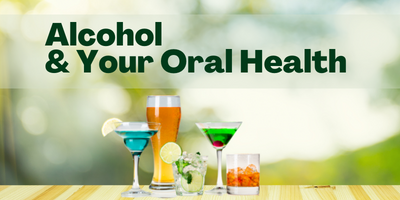
You don’t have to be a doctor to know that consuming too much alcohol can have negative effects on your health. But did you know that alcohol also affects your mouth health? While it’s okay to have a glass of wine or beer every now and then, frequent alcohol consumption can actually have a pretty serious effect on your teeth and gums. Let’s go through the most common effects and what you can do to balance them out!
Dry Mouth
Beverages that are high in alcohol can cause dehydration which causes dry mouth. Basically, the dehydrating effect of alcohol on the body affects the amount of saliva your mouth makes. Saliva naturally washes away the harmful bacteria that cause infections and tooth decay that would otherwise stick to your teeth and gums. To help combat the dehydrating effect of alcohol, try to drink a glass of water for every glass of alcohol you consume to help the natural creation and flow of saliva in your mouth!
Tooth Erosion
Alcoholic beverages like cider, beer, and white wine can be very acidic. The acid in these drinks can wear away at your tooth enamel, the thin outer layer covering, a process known as tooth erosion. Not only does tooth erosion affect the appearance of your teeth, but it can also lead to a lack of protection against bacteria. Since your tooth enamel protects your teeth from bacteria, its erosion can lead to cavities and infections. To help combat tooth erosion, try to keep your alcohol consumption around meal times – breaking up the constant flow of alcohol with food and water can help to minimize the effect of acid on your teeth.
Stained Teeth
Darker alcoholic beverages like red wine, dark liquors, mixed drinks with dark sodas, and/or dark beers (like dark barley and malt) can stain your teeth. The molecules that are responsible for the dark color – called chromogens – attach to the tooth enamel that has been compromised by the alcohol’s acid, hence leading to discoloration. To counteract the staining effect of alcohol, try rinsing your mouth with water after you consume a darker beverage.
Cavities and Plaque Buildup
Alcoholic beverages like cocktails and wine can have high sugar content. The bacteria in your mouth thrive on foods and drinks high in sugar. So the more sugary things you consume, the more likely it is that bacteria will cause plaque buildup and cavities. The best way to avoid this is to minimize your intake of sugary alcoholic beverages or alternate between an alcoholic beverage and a glass of water to help with the natural production of saliva.
These are just a few of the ways that alcohol can affect your oral health. If you have questions, ask your dentist at your next cleaning appointment.
Need to book your next appointment? Fill out our appointment request form!





